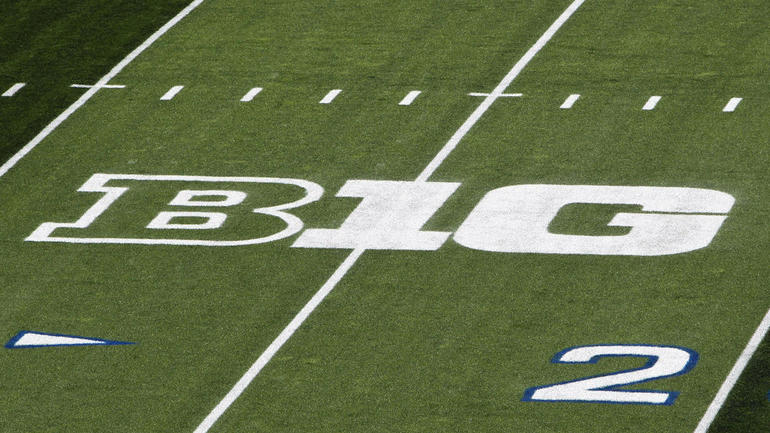
Following a morning meeting of the conference's presidents, the Big Ten on Tuesday decided to cancel the college football season for fall 2020 with hopes of playing in spring 2021. With this decision, the Big Ten has become the first Power Five conference to decide not to play this fall amid the COVID-19 pandemic.
Sentiment throughout college football entering Sunday night was that the Big Ten and Pac-12 would cancel their seasons this week. However, the combination of outspoken coaches and the #WeWantToPlay X #WeAreUnited movement that developed suddenly late Sunday seemed to give pause to the five major conferences.
Want more college football in your life? Listen below and subscribe to the Cover 3 College Football podcast for top-notch insight and analysis beyond the gridiron.
Big Ten coaches -- including Ohio State's Ryan Day, Michigan's Jim Harbaugh, Penn State's James Franklin and Nebraska's Scott Frost -- publicly advocated for playing the 2020 season on Monday. However, their pleas and those of Big Ten players were not enough to change the collective minds of Big Ten leaders.
In a statement released Tuesday, the Big Ten announced that "multiple factors" including the "medical advice and counsel" from its experts led to what it is deeming the "postponement of the 2020-21 fall sports season."
"The mental and physical health and welfare of our student-athletes has been at the center of every decision we have made regarding the ability to proceed forward," said Big Ten commissioner Kevin Warren. "As time progressed and after hours of discussion with our Big Ten Task Force for Emerging Infectious Diseases and the Big Ten Sports Medicine Committee, it became abundantly clear that there was too much uncertainty regarding potential medical risks to allow our student-athletes to compete this fall.
"We know how significant the student-athlete experience can be in shaping the future of the talented young women and men who compete in the Big Ten Conference. Although that knowledge made this a painstaking decision, it did not make it difficult. While I know our decision today will be disappointing in many ways for our thousands of student-athletes and their families, I am heartened and inspired by their resilience, their insightful and discerning thoughts, and their participation through our conversations to this point. Everyone associated with the Big Ten Conference and its member institutions is committed to getting everyone back to competition as soon as it is safe to do so."
Myocarditis emerged as a significant health concern that largely led to the Big Ten's decision. The condition involves an inflammation of the heart muscle. It can reduce the heart's ability to pump, causing rapid or abnormal heartbeat.
At least 15 Big Ten players have been left with myocarditis after contracting COVID-19, according to a high-ranking source within the Big Ten.
"Myocarditis is the ballgame right now," the source said. "Myocarditis is the major issue they're looking at. … Between the Pac-12 and the Big Ten, that's what is really driving the push to push this off to spring."
In its latest medical guidelines, the NCAA said infected persons "of any age" with underlying heart conditions are a risk. There's at least one Power Five school where athletes who test positive for the coronavirus automatically get an EKG. Big 12 commissioner Bob Bowlsby told the Associated Press on Sunday there was "growing evidence" of concern over myocarditis. Medical experts have told West Virginia athletic director Shane Lyons that moving to the spring "will give us more time to be able to understand if the virus does necessarily impact the heart."
Recovery from myocarditis can vary anywhere from a few weeks to a few months, according to Harvard Medical School.
The Big Ten's cancellation affects all fall sports, including cross country, field hockey, soccer and volleyball.
For weeks, it was believed that, if any Power Five conference decided to punt first on playing college football in the fall, it would be the Big Ten. After all, this was the conference that announced over a month ago it was moving to a conference-only schedule for the fall.
The Big Ten became the first conference to make such that adjustment in a move that blindsided their Power Five brethren. However, in short order, the other conferences ultimately made similar moves albeit with varied configurations and projected start dates.
Will the other Power Five conferences follow suit with canceling their fall 2020 seasons? Pac-12 presidents are meeting Tuesday afternoon to decide just that. The SEC and ACC appear prepared to move forward, while the Big 12 is currently in limbo.
Though cancellations have been taking place at all levels of college football, only recently did they affect the 130-team FBS. UConn was the first FBS team to call curtains on a fall 2020 season last week; UMass followed suit on Tuesday. The MAC was the first FBS conference to call off playing fall sports; it was joined by the Mountain West on Monday. Old Dominion on Monday became the first individual member of an FBS conference (Conference USA) to cancel its season.
More than 30 Power Five players have opted out of playing this season.
There are now 89 of 130 FBS teams set to play the 2020 college football season at this time.





















